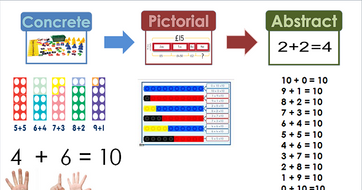
Our Vision (Intent)
At St Augustine’s CE Primary School, mathematics is taught discretely in a daily lesson, as well as forming part of other lessons. We aim to provide a mathematical curriculum that contributes to the acquisition of life-long skills and promotes enjoyment and enthusiasm for learning through practical activity, exploration and discussion.
We believe that Mathematics should be creative and engaging. It should be presented through a context which is meaningful and stimulating for all children, at their own level. Children should be confidently able to apply their skills and knowledge to imaginatively solve problems. Lessons include whole class, group, paired and individual work. Problem solving and reasoning are an important part of every lesson. Learning through a clear progression of mental and written methods, children develop understanding and the skills to carry out calculations independently.
Mathematics is a highly interconnected discipline that has been developed over centuries, providing the solution to some of history’s most intriguing problems. It is essential to everyday life, critical to science, technology and engineering, and necessary for financial literacy and most forms of employment. A high-quality mathematics education therefore provides a foundation for understanding the world, the ability to reason mathematically, an appreciation of the beauty and power of mathematics, and a sense of enjoyment and curiosity about the subject.
Aims of the National Curriculum
The national curriculum for mathematics aims to ensure that all pupils:
- become fluent in the fundamentals of mathematics, including through varied and frequent practice with increasingly complex problems over time, so that pupils develop conceptual understanding and the ability to recall and apply knowledge rapidly and accurately
- reason mathematically by following a line of enquiry, conjecturing relationships and generalisations, and developing an argument, justification or proof using mathematical language
- can solve problems by applying their mathematics to a variety of routine and non-routine problems with increasing sophistication, including breaking down problems into a series of simpler steps and persevering in seeking solutions
Mathematics is an interconnected subject in which pupils need to be able to move fluently between representations of mathematical ideas. The programmes of study are, by necessity, organised into apparently distinct domains, but pupils should make rich connections across mathematical ideas to develop fluency, mathematical reasoning and competence in solving increasingly sophisticated problems. They should also apply their mathematical knowledge to science and other subjects.
The expectation is that the majority of pupils will move through the programmes of study at broadly the same pace. However, decisions about when to progress should always be based on the security of pupils’ understanding and their readiness to progress to the next stage. Pupils who grasp concepts rapidly should be challenged through being offered rich and sophisticated problems before any acceleration through new content. Those who are not sufficiently fluent with earlier material should consolidate their understanding, including through additional practice, before moving on.
What does this look like in our school? (Implementation)
At St Augustine’s CE Primary, we follow an approach to teaching mathematics that involves using concrete materials, pictorial representations and abstract representations in every year group. This ensures a understanding of mathematical concepts during individual lessons and over time.

Our spiral curriculum builds up knowledge over time, enabling all children to become confident mathematicians.
Throughout the school, maths lessons promote discussion and exploration, with a strong emphasis on mathematical language, speaking in full sentences, and reasoning (by children consistently being required to explain how they know).
Maths lessons include specific questions, which draw out children’s understanding and identify and misconceptions immediately. Examples of these questions include:
We have a clear progression in our four operations and this is supported by our whole school calculation policy, as you can see below. The manipulatives and images we use to scaffold this for children are carefully selected to build up solid mental models and eventually allow children to be able to calculate using both written and mental methods.
What difference does this make? (Impact)
How are children assessed?
Each child is assessed daily, through assessment for learning and teaching is tailored to meet the needs of the children.
Children will take a test at the end of each term, this will be used to inform teaching in the lessons which follow and allow for planning of interventions.
Children take SATs tests at the end of KS2 and a Multiplication Check at the end of year 4.
These information leaflets for parents are both for the school year 2023-24, new versions will be published as soon as they are released by the DFE.
KS2 SATs Results 2023-24
Last year, our Year 6's performed amazingly on their KS2 SATs with...
- 79% of the children achieving the expected standard or higher in Mathematics.
- 21% of the children achieved the high standard in Mathematics.
Multiplication Check Results 2023-24
Last year, our Year 4's also performed fantastically on their Multiplication Check with...
67% of children achieving full marks of 25/25
83% of children scoring 22/25 or above
As a school, this brings our current mean average to 23.3.
How can I support my child with Maths at home?
Below are links to a range of apps and websites which children can use to improve their Maths learning at home. We already use many of these in school, so children should be familiar with them...





































